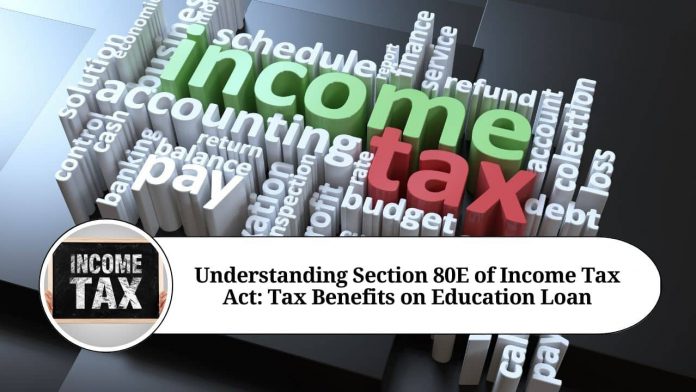Pursuing higher education has become a necessity in today’s world to stay competitive in the job market. However, the cost of education is skyrocketing, and not everyone can afford it. To provide relief to students and their families, the Indian government has introduced tax benefits on education loans under Section 80E of the Income Tax Act. In this article, we will discuss the provisions of Section 80E and how it benefits students who have availed of education loans.
Section 80E of the Income Tax Act: An Overview
Section 80E of the Income Tax Act was introduced in 1961 and was last amended in 2020. This section provides a deduction for the interest paid on education loans taken for higher education. The deduction is available only to individuals and not to HUFs (Hindu Undivided Families) or any other entity. The deduction is available for eight consecutive years, starting from the year in which the interest repayment begins.
Eligibility Criteria for Deduction under Section 80E
To claim a deduction under Section 80E, an individual must meet the following eligibility criteria:
- The loan must have been taken from a financial institution or a charitable institution for the higher education of the individual, spouse, or children.
- The loan must have been taken for pursuing post-secondary education in India or abroad. Post-secondary education includes all courses pursued after completing the senior secondary examination or its equivalent.
- The loan must have been taken for a full-time course, including graduate, postgraduate, vocational, or diploma courses. Part-time courses are not eligible for deduction under Section 80E.
- The loan must have been taken for an eligible course from an eligible institution. An eligible course is a course that leads to a degree or diploma recognized by any university, college, or other institution recognized by the government. An eligible institution is any institution recognized by the government or any other authority authorized to do so.
Provisions of Section 80E
- Deduction on Interest Payment: Section 80E allows a deduction on the interest payment of the education loan. The deduction is available only for the interest payment and not for the principal repayment. The deduction is available for eight years or until the interest is fully paid, whichever is earlier. The deduction is available from the year in which the interest repayment starts.
- Quantum of Deduction: There is no upper limit on the quantum of deduction that can be claimed under Section 80E. The entire interest paid on the education loan is eligible for deduction.
- Mode of Payment: The interest payment must be made from the taxable income of the individual claiming the deduction. If the interest payment is made from the income of the spouse or any other family member, the deduction cannot be claimed.
- No Double Benefit: The deduction under Section 80E cannot be claimed if the interest payment has already been claimed as a deduction under any other provision of the Income Tax Act.
- Carry Forward: If the interest payment is not fully utilized for claiming the deduction in a particular year, the unclaimed amount can be carried forward to the next year. However, the deduction can be claimed only for the interest payment and not for the principal repayment.
Final Conclusion
Section 80E of the Income Tax Act is a beneficial provision for students and their families who have availed of education loans for pursuing higher education. The deduction on the interest payment of the education loan provides relief to the taxpayers and helps in reducing their tax liability. The provision is also a step towards making higher education accessible to all, irrespective of their financial background.
Frequently Asked Questions:
Q: What is section 80E of the Income Tax Act?
A: Section 80E of the Income Tax Act allows individuals to claim a deduction on the interest paid on an education loan for higher studies.
Q: Who can claim the deduction under section 80E?
A: The deduction under section 80E can be claimed by individuals who have taken an education loan for their own higher studies or the education of their spouse or children.
Q: What is the maximum amount of deduction that can be claimed under section 80E?
A: There is no upper limit on the amount of deduction that can be claimed under section 80E. However, the deduction is limited to the amount of interest paid on the education loan.
Q: What type of education loans are eligible for deduction under section 80E?
A: Only education loans taken for higher studies are eligible for deduction under section 80E. The loan must have been taken from a financial institution or approved charitable institution.
Q: What is considered higher education under section 80E?
A: Higher education for section 80E includes any course of study pursued after passing the senior secondary examination or its equivalent. This includes both vocational and regular courses.
Q: Is the deduction under section 80E available for both principal and interest on education loans?
A: No, the deduction under section 80E is available only for the interest paid on the education loan.
Q: Can the deduction under section 80E be claimed for loans taken for education outside India?
A: Yes, the deduction under section 80E can be claimed for education loans taken for higher studies outside India.
Q: Is there any time limit for claiming a deduction under section 80E?
A: Yes, the deduction under section 80E can be claimed only for a maximum of 8 years or until the interest on the education loan is fully paid, whichever is earlier.
Q: How is the deduction claimed under section 80E?
A: The deduction under section 80E can be claimed while filing an income tax return by submitting the relevant documents and details of the interest paid on the education loan.




















